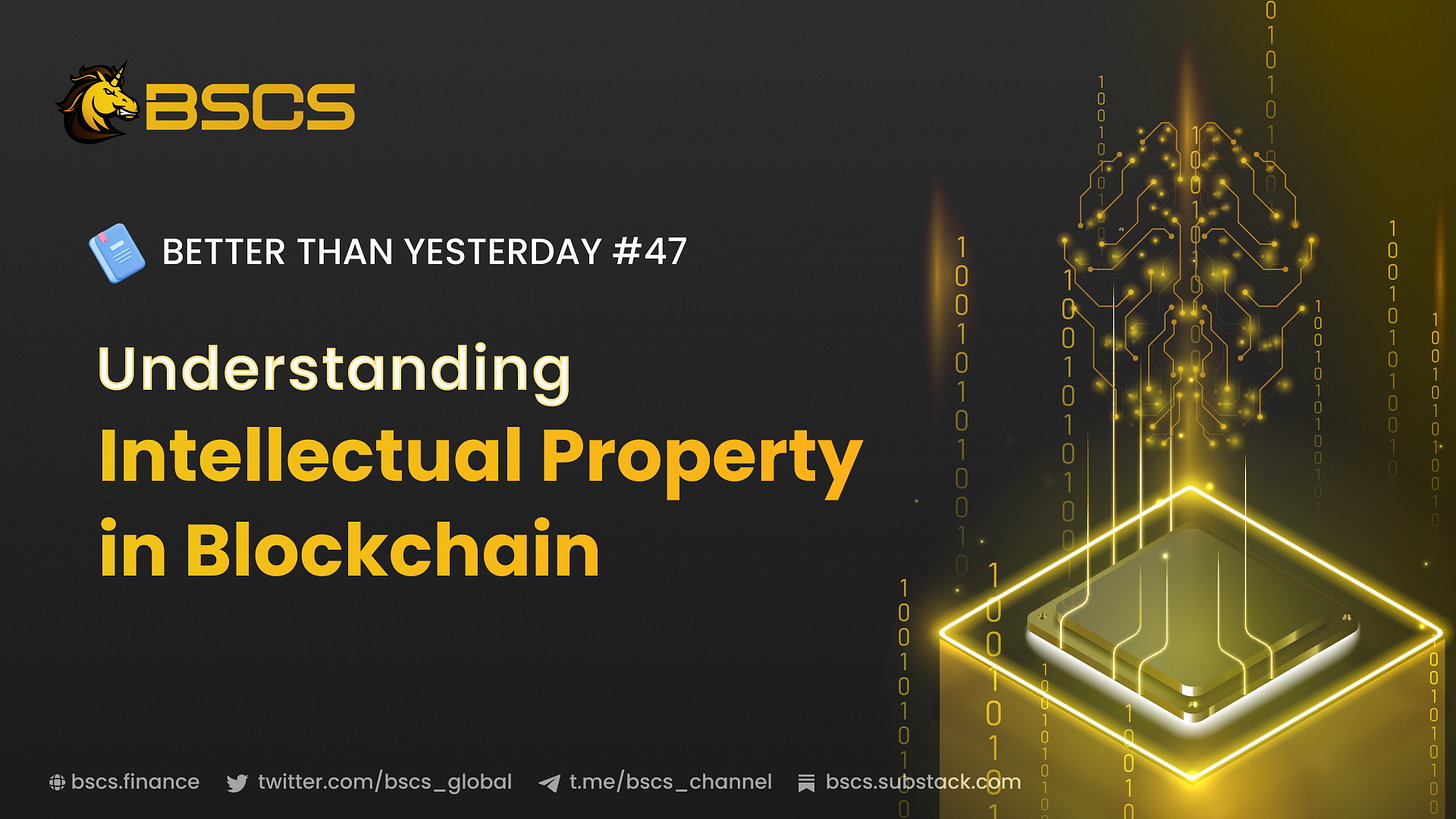📕 Better than Yesterday #47: Understanding Intellectual Property in Blockchain
The blockchain industry, known for its decentralization and transparency, is undergoing a transformative phase with the growing influence of Intellectual Property (IP).
As blockchain continues to disrupt traditional industries, IP rights are emerging as a cornerstone to ensure innovation, protect creators, and establish trust in a trustless environment.
This post delves into how Intellectual Property is shaping the blockchain landscape, its applications, benefits, and the challenges ahead.
ℹ️ What is Intellectual Property (IP)
Intellectual Property encompasses legal rights for creations of the mind, including inventions, art, trademarks, and trade secrets.
In the blockchain realm, where open-source and decentralized principles dominate, IP plays a complex but vital role.
Protecting proprietary elements of blockchain technology—like consensus algorithms and smart contracts — ensures innovators receive credit and financial returns.
ℹ️ Applications of Intellectual Property in Blockchain
1. Securing Blockchain Innovations
Blockchain protocols depend on advanced cryptography, consensus mechanisms, and data structures. Patenting these innovations shields inventors legally and encourages a competitive, collaborative environment.
Example: IBM leads in patenting blockchain innovations, securing multiple patents for solutions like supply chain optimization and asset tokenization.
2. Protecting Digital Assets
Intellectual Property is essential for digital assets like NFTs, which signify ownership of unique digital items and depend on copyright laws for verifying originality.
Example: Artists like Beeple use blockchain to tokenize their artwork, ensuring verification and protection from unauthorized reproduction.
3. Licensing Smart Contracts
Smart contracts are self-executing agreements programmed into code, vital for automating blockchain transactions. Licensing these frameworks enables creators to maintain code control while allowing broader use.
Example: Ethereum developers use open-source licensing for tools like Solidity, balancing accessibility and protection.
4. Enabling Tokenization of Intellectual Property
Blockchain allows for the tokenization of IP, enabling rights to be traded or fractionalized, creating new revenue streams and democratizing access to intellectual assets.
Example: A pharmaceutical company could tokenize a patented drug formula, enabling investors to buy shares in its royalties.
Use Cases: Intellectual Property and Blockchain Synergy
Pharmaceutical Patents
Companies like Moderna could use blockchain to secure patents, streamline clinical trial data, and ensure authenticity across global supply chains.
Media and Entertainment
Music platforms such as Audius use blockchain to help artists maintain control over their IP, ensuring royalties are distributed transparently.
Fashion and Luxury Goods
Brands like Louis Vuitton utilize blockchain to authenticate high-end products, leveraging IP to combat counterfeiting.
Intellectual Property is integral to fostering innovation and protecting assets in the blockchain space. However, challenges like balancing openness and exclusivity highlight the need for thoughtful approaches to IP frameworks.
In the next article, we’ll dive deeper into real-world use cases, potential pitfalls, and what the future holds for IP in blockchain technology.
About BSCS
BSCS - The fully decentralized protocol for launching new ideas. An all-in-one Incubation Hub with a full-stack Defi platform across all main blockchain networks. We provide exclusive services including IDO/INO Launchpad, Yield farming, NFT Auction, Marketplace, and BSCSwap.
BSCS operates on top of all main blockchain networks and is designed to offer maximum value to consumers and institutions.
BSCS platform uses the Sharing Economy Model for the purpose of profit-sharing, helping users to access DeFi platforms in the easiest, safest, and most cost-effective way. BSCS is the most convenient bridge to connect users and application products on all main blockchain networks.
Website | Telegram | Substack | Twitter | Discussion


